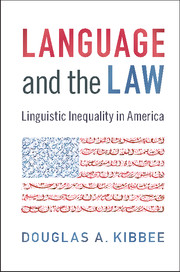Book contents
- Frontmatter
- Contents
- Preface
- Acknowledgments
- 1 Equality, Liberty, and Fairness in America
- 2 Language and Democracy
- 3 Linguistic Inequality in the Legal System
- 4 Language and Education
- 5 Government, Public Services, and the English-Only Movement
- 6 Language in the Workplace
- 7 Conclusions
- Bibliography
- Index of Court Cases
- Index of Names
- General Index
2 - Language and Democracy
Published online by Cambridge University Press: 05 August 2016
- Frontmatter
- Contents
- Preface
- Acknowledgments
- 1 Equality, Liberty, and Fairness in America
- 2 Language and Democracy
- 3 Linguistic Inequality in the Legal System
- 4 Language and Education
- 5 Government, Public Services, and the English-Only Movement
- 6 Language in the Workplace
- 7 Conclusions
- Bibliography
- Index of Court Cases
- Index of Names
- General Index
Summary
One of the rallying cries of the American Revolution was “No taxation without representation.” The fundamental promise of a democracy is the opportunity to participate in the direction of the society one lives in. As Western democracies developed from the eighteenth century on, this promise has been realized through the election of representative government, and sometimes through direct voting on specific issues in referenda. The extension of that opportunity to an ever-expanding number of adults, the methods of delivery on that promise, and the ultimate effectiveness of democracy for representing common interests all intersect with considerations of the language of potential participants in self-government. The expansion of the right to vote focuses on individuals’ input, while effectiveness stresses outcomes relating to group membership. Both individual and group claims thus present issues linking language and the law.
Even before voters get their say, the choices open to them can be limited by language. Arizona had an English literacy test for voters from the time of its entry into the Union as a state (1912), a law overthrown by the Voting Rights Act of 1970. The Voting Rights Act says nothing about candidacy for election. Even before Arizona was a state, the territorial code declared ineligible for office anyone who “cannot write and read in the English language,” and the Enabling Act of 1910 requires of all state officers “the ability to read, write, speak and understand the English language sufficiently well to conduct the duties of the office without the aid of an interpreter.” Arizona's version of an English-only law, in 1988, included a provision in the state constitution requiring English fluency of all public office holders.
In San Luis, a small town on the Mexican border, Alejandrina Cabrera wanted to be a candidate for the city council; the sitting mayor, Juan Carlos Escamilla challenged her right to be on the ballot, given her lack of proficiency in English. The Arizona Supreme Court ruled in favor of the mayor, after admitting testimony of an expert who evaluated the English proficiency required to function in the position and Ms. Cabrera's level. As to the general principle of excluding those who do not speak English from public office, the court found that “there is no general constitutional right to seek or hold public office” (2012, at 207).
- Type
- Chapter
- Information
- Language and the LawLinguistic Inequality in America, pp. 33 - 52Publisher: Cambridge University PressPrint publication year: 2016

